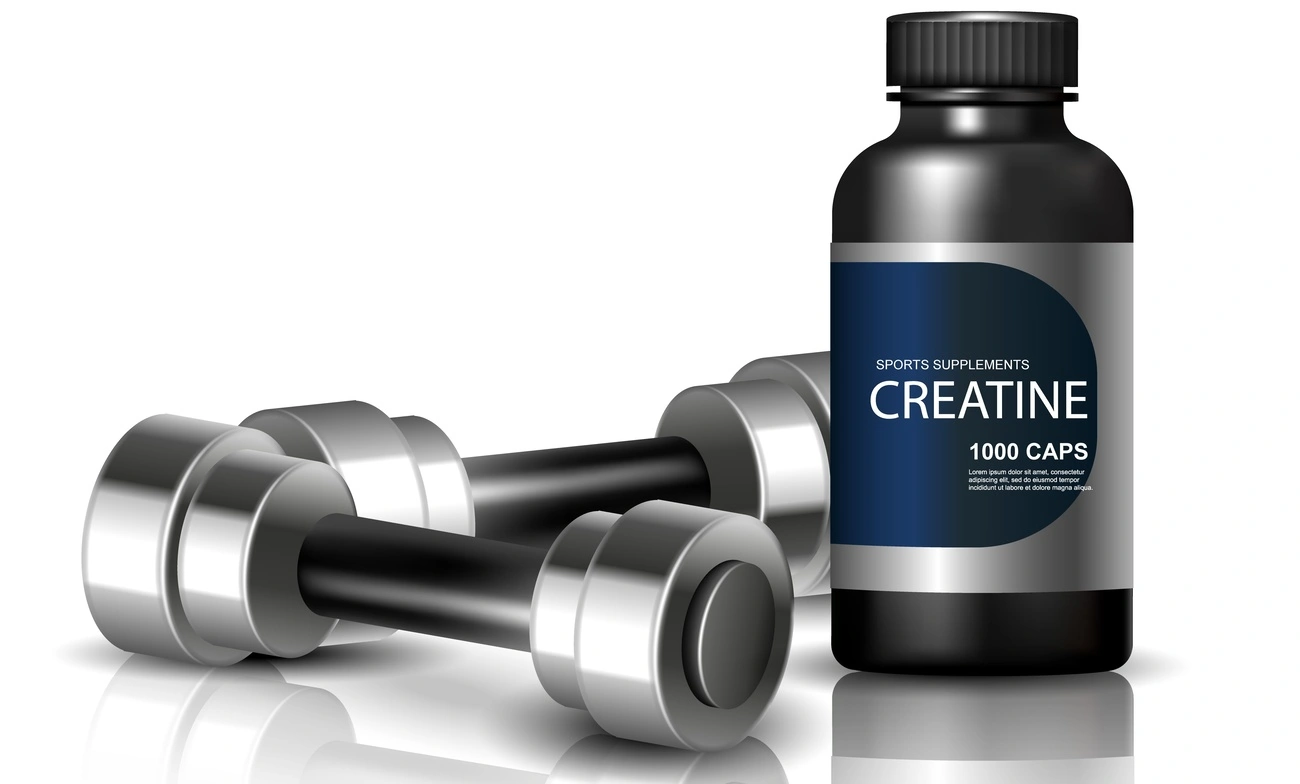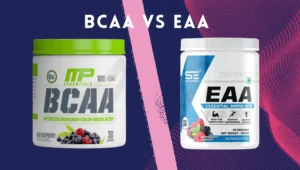Introduction
Hey there, welcome to the exciting world of creatine – a super cool player in the fitness game. Creatine, a powerhouse in the realm of fitness and performance enhancement. Understanding creatine can help you attain your health objectives whether you’re a fitness pro or just starting out. This blog will explain what creatine is, how creatine helps, creatine benefits, it’s myth, best creatine type for you and how to use it safely.
Table of Contents
ToggleWhat's Creatine?
Creatine is a natural thing found in some foods and made by our bodies. It helps make a special kind of energy called ATP, which our cells use. Creatine is like the superhero of your body’s energy world, always ready to swoop in and save the day during those high-intensity moments. It’s a natural compound hanging out in your muscles, helping generate a special kind of energy called ATP. Imagine it as your personal energy reserve for quick, powerful movements, whether you’re lifting weights, sprinting, or pushing through a challenging workout.
In simpler terms, creatine is your go-to sidekick for bursts of strength and speed. It’s not a mysterious potion; it’s a naturally occurring champion that supports your muscles when they need a rapid boost of power. So, the next time you’re crushing it at the gym or sprinting for the bus, thank creatine for being the unsung hero making it all possible. It’s like your body’s own power-up button, ready to fuel your feats of strength and keep you moving forward.
Where creatine hangs out in our bodies
Creatine's Home Base: Your Mighty Muscles

Imagine your muscles as the VIP club for creatine. Around 95% of creatine decides to throw the ultimate party right there, making it the muscle’s main hotspot. Now, if we break it down, it’s the fast-twitch muscle fibers that are the real party animals. These are the muscles in charge of those quick, intense moves – like sprinting to catch the bus or lifting something heavy. Creatine is also found some spots in brain, liver and kidneys.
Inside the Muscles: The Creatine Playground
Within the muscles, creatine takes the form of phosphocreatine. Think of it as the VIP section within the VIP club. This is where the real magic happens during high-octane activities. When you need a sudden burst of energy for, let’s say, a powerful sprint or lifting weights that feel like they’re made of lead, creatine steps up to the plate. Cheers to creatine – the muscle’s MVP!
How Creatine Works
Creatine primarily functions by replenishing ATP stores in our muscles, allowing for sustained energy during short-duration, high-intensity exercises. When we do activities that need a lot of power in a short time, like lifting heavy things, your muscles tap into creatine phosphate stores to produce ATP on the spot. This instant energy boost can enhance your performance and contribute to increased strength and power output. Creatine does its job by refilling our energy stores super-fast during quick, intense exercises. It’s like a power-up for our muscles.
Health Benefits of Creatine

Creatine offers a myriad of benefits beyond just improved athletic performance. Get ready to discover the superhero of supplements – Creatine! This powerhouse is not just your average fitness sidekick; it’s a game-changer with a bunch of health benefits of creatine that can amp up your health and wellness journey.
Muscle Powerhouse
On of the very well-known health benefits of creatine is this is your muscles’ best friend. It helps generate adenosine triphosphate (ATP), the fuel your muscles need for quick, powerful movements. Whether you’re lifting weights, sprinting, or doing high-intensity workouts, creatine steps in to supercharge your muscles.
Strength Boost
The second creatine benefits are whenever you need an extra push during your workouts? Creatine has your back. Studies show that supplementing with creatine can enhance strength gains, helping you lift heavier and push harder, ultimately leading to more significant improvements in muscle strength.
Faster Recovery
Ever wish you could bounce back from a tough workout faster? Creatine might be the secret ingredient. It’s been linked to faster recovery times, meaning you can hit the gym more frequently and make gains without feeling like you’ve been hit by a truck the next day.
Muscle Growth Magic
Looking to sculpt those muscles? Creatine helps in muscle building by increasing water content in muscle cells and boosting the levels of certain growth-promoting hormones. It’s like giving your muscles the green light to grow and define themselves. If you are skinny and looking to build more muscles, creatine is not only thing in such case here is I have described many other things that help in building muscles for skinny guys.
Brainpower Boost
Creatine isn’t just for your biceps; it’s a brain booster too. Some research suggests that creatine can enhance cognitive function, improving memory and overall brain performance. So, not only will your body be in top shape, but your mind will be sharp too.
High-Intensity Hero
If your workouts involve short bursts of power, creatine is your secret weapon. It’s proven to be exceptionally effective in activities that require quick, intense efforts, making it a must-have for sprinters, weightlifters, and anyone who loves a high-energy workout.
Simple and Safe
Worried about the Creatine effect and side effects? Fear not! Creatine is one of the most researched supplements out there, and it’s considered safe when used appropriately. Just follow the recommended doses, and you’re on your way to reaping the benefits.
Moreover, creatine has shown promise in supporting cognitive function, making it not just a favorite among gym-goers but also among individuals seeking cognitive enhancements.
Creatine doesn’t just help us in the gym. It also helps muscles grow, makes us stronger, and helps us recover faster after workouts. Plus, it might boost how our brain works, making it not just for gym lovers but also for people who want to be super smart!
So, whether you’re aiming for gains at the gym, looking to recover faster, or just wanting an extra edge in your overall wellness, creatine might be the missing piece to your health puzzle. Get ready to unleash the creatine benefits and take your fitness journey to the next level!
Sorting Out Creatine Myths and Worries

Despite its well-established benefits, creatine has been subject to various myths and misconceptions. Some folks have heard things about creatine that aren’t true. This part clears up common myths, like worries about our kidneys, holding water, and doing a “loading phase.” Science shows creatine is safe and works well when we use it the right way, so no need to stress. common myths surrounding creatine, such as concerns about kidney health, water retention, and the infamous “loading phase.”
Let’s debunk some creatine myths and clear the air on worries surrounding this fitness superstar. Creatine has been under the spotlight, and it’s time to separate fact from fiction.
Myth 1: Creatine is a Steroid Sneak Peek
Reality: Nope, creatine is not a secret doorway to the world of steroids. It’s a naturally occurring compound in the body, and supplementing with it won’t turn you into a bodybuilding monster overnight. Creatine supports your body’s energy needs during intense activities, but it’s not in the same league as steroids.
Myth 2: Kidney Conundrum
Reality: Worried about your kidneys? Relax. Research indicates that, for healthy individuals, creatine doesn’t throw a party that harms your kidneys. Of course, if you have pre-existing kidney issues, it’s best to chat with your healthcare superhero before adding creatine to the mix.
Myth 3: Creatine Causes Water Weight Woes
Reality: Water weight or bloating? Creatine might bring a bit of extra water into your muscle cells, but it’s not the villain causing your jeans to feel snug. This water weight is more like a sidekick, assisting in muscle hydration, not puffing you up like a balloon.
Myth 4: Loading is a Must-Do Maneuver
Reality: Loading up on creatine at the start isn’t mandatory. While some opt for a loading phase, studies show that a steady, lower daily dose works just fine. Loading can speed up muscle saturation, but it’s not the only ticket to Creatine City.
Myth 5: Creatine + Caffeine Catastrophe
Reality: Heard that caffeine cancels out creatine? It’s more of a myth than reality. While some studies suggest they might compete for absorption, having your coffee won’t completely nix the creatine benefits. Just consider timing or enjoy them separately for peace of mind.
Myth 6: Creatine is Just for Gym Buffs
Reality: Creatine isn’t exclusive to gym enthusiasts. Whether you’re into weightlifting or just want more oomph for your HIIT workouts, creatine can be your ally. It’s not a membership card to the gym; it’s an invitation to enhance overall performance.
In a nutshell, creatine is a misunderstood hero in the world of fitness. It’s safe, effective, and not the cause of the worries some myths suggest. So, let go of the misconceptions, embrace the facts, and let creatine be the superhero it truly is – your fitness friend, not a foe!
Types of Creatine

There are several types of creatine available in the market. It’s essential to note that new formulations may emerge, and the popularity of specific types may change over time. Here are some common types of creatine:
Creatine Monohydrate:
This is the most preferred and researched and widely used creatine form. It is very popular for its effectiveness.
Creatine Hydrochloride (HCL):
Marketed as a more soluble form of creatine, HCL is believed to be absorbed more efficiently than creatine monohydrate. It’s often suggested for those who experience digestive issues with creatine monohydrate.
Micronized Creatine:
This form undergoes a micronization process to break the creatine particles into smaller sizes, theoretically improving absorption.
Creatine Ethyl Ester:
This form is created by attaching an ester molecule to creatine, with claims of enhanced absorption. However, research on its effectiveness is limited.
Buffered Creatine:
Also known as Kre-Alkalyn, buffered creatine is marketed as having a higher pH level, which is said to reduce conversion to creatinine (a byproduct of creatine breakdown).
Creatine Nitrate:
In this form, creatine is bonded with nitrate, and it’s suggested to improve solubility and absorption. However, these claims need to explore more to validate.
Tri-Creatine Malate:
This form combines creatine with malic acid, potentially enhancing absorption and reducing stomach discomfort.
What is Your Best Creatine Type
Below I have mentioned some main reasons why the monohydrate form of creatine is mostly considered the great choice for muscle building and maximum strength increase.
Creatine monohydrate is the most studied and extensively used creatine type for muscle growth. Creatine is safe and very effective, there is many health benefits of creatine and also very it is very affordable this is been shown in many studies. It has considered the gold standard in creatine supplementation. Creatine monohydrate is usually considered safe for most people when taken at the prescribed amounts. It has a long history of use, and various health organizations, including the International Society of Sports Nutrition (ISSN), have certified it safe to consume. Creatine monohydrate is easily absorbed by the body due to its high bioavailability. This ensures that the creatine reaches the muscles efficiently, providing the desired benefits. While some creatine supplements recommend an initial loading phase of higher doses, creatine monohydrate has been shown to be effective even without a loading phase. This simplifies the supplementation process for many users.
Adding Creatine to Your Routine

Adding Creatine in your routine may be tricky for many but it’s very straightforward and very easy to consume. Don’t be doubtful about when to take it, how much to take, how to mix and more.
When to Take Creatine
There are no such guidelines for consuming creatine supplement but one thing is mostly recommended is consume creatine at the same time each day to maintain an optimum level in your body and get maximum health benefits of creatine. You can take creatine before or after your workout. Some prefer it pre-workout for an energy boost, while others take it post-workout to aid recovery. If you have trouble remembering or prefer not to take it around workouts, mix creatine with a meal. This ensures you take it daily.
How Much Creatine to Take
Loading Phase (Optional)
Some people choose a loading phase of 20 grams per day (divided into 4 doses) for the first week to saturate muscle creatine stores quickly. However, this isn’t necessary; you can skip the loading phase and take a regular dose.
Maintenance Phase
After the loading phase (if chosen), a common maintenance dose is 3-5 grams per day. If you skip loading, you can start with the maintenance dose directly.
Body Weight Consideration
A general guideline is 0.03 grams of creatine per kilogram of body weight for maintenance. Adjust based on your response and preferences.
Mixing with Other Substances
Water or Juice or Protein Shakes
Creatine can be mixed with water or juice and with Protein shakes for easy consumption. It doesn’t necessarily need to be mixed with a specific liquid.
Avoid Caffeine Interaction
Some studies suggest that caffeine may interfere with creatine uptake. If you’re concerned, consider taking them at different times.
Recommended Doses for Males and Females
Males
Follow the general guidelines mentioned earlier: 3-5 grams per day for maintenance. Adjust based on your weight and response. To get the maximum health benefits of creatine follow to proper guidelines of its does.
Females
Females can follow similar guidelines to get max health benefits of creatine. Females can also adjust creatine does according to their body weight and age, there is no specific guidelines for females. Creatine can be safe for both genders.
Always Remember While Cunsuming Creatine
Stay Hydrated
Drink plenty of water, especially on days you’re active, to support creatine absorption.
Individual Variability
Individual responses to creatine can vary, so it’s essential to pay attention to how your body reacts.
Consult a Professional
There in numbers of health benefits of creatine, before starting any supplement regimen, including creatine, it’s wise to consult with a healthcare or fitness professional, especially if you have any pre-existing conditions or concerns.0
Natural Source of Creatine

While creatine is naturally produced in the human body, it can also be obtained through certain foods, although the amounts are relatively small. Here are some food sources that contain creatine:
Red Meat
Beef, particularly lean cuts like sirloin or tenderloin, is one of the richest sources of creatine. Pork and lamb also contain moderate amounts.
Fish
Fish like salmon and tuna are good sources of creatine. Other seafood options, such as haddock and cod, also contain smaller amounts.
Poultry
Chicken and turkey provide some creatine, especially in the dark meat.
Vegetarian Sources
While creatine is mostly found in animal products, smaller amounts can be obtained from vegetarian sources like milk and cheese.
Game Meat
Venison and other game meats can be rich sources of creatine.
Creatine-Rich Foods (Smaller Amounts)
Some foods naturally contain creatine, though in smaller amounts. These include eggs and small amounts in certain plant foods like beets and nuts.
Conclusion
This Blog is armed with knowledge about its creatine functions, health benefits of creatine, and proper usage, you can confidently harness the power of creatine to elevate your fitness experience and achieve your health goals. To wrap it up, creatine is a fantastic tool for boosting fitness and feeling awesome. Knowing how it works, the good stuff it does, and the right way to use it lets you make the most of this cool supplement. Being smart about it is the key to unlocking all the benefits creatine has to offer. Remember before using creatine supplement in your fitness journey conduct good research on it and then get ready to take your fitness to next level.
Some other reference of creatine –
CREATINE: Overview, Uses, Side Effects, Precautions, Interactions, Dosing and Reviews (webmd.com)




